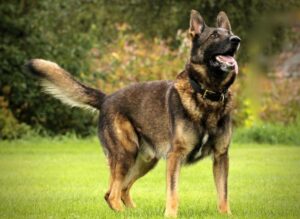The German Shepherd dog breed is a magnificent and versatile canine breed that has won over many dog enthusiasts worldwide.
Table of Contents
Introduction
German Shepherd breeds are one of the most popular and famous breeds; they are smart, loyal, and hardworking. In this extensive study, we will go through German Shepherd breeds’ history, traits, temperament, training, health, and roles in law enforcement and family companionship.
History of German Shepherd Dog Breed

Origins
The German Shepherd breed’s fascinating history began in late 19th-century Germany. Captain Max von Stephanitz, a distinguished German cavalry officer, envisioned a wonderful and adaptable working dog.
Captain Max von Stephanitz, the founder of the German Shepherd breeds’, wanted to create a smart, athletic dog. He selectively bred native herding and farm dogs to achieve this ambitious goal.
Stephanitz believed that a well-designed dog breed could revolutionize herding and working dogs by improving efficiency and adaptability. He understood that intelligence and physical prowess were essential qualities for the breed he envisioned.
Captain Stephanitz created a canine that reflected his values through careful breeding. This newly emerging breed soon began to exhibit the distinctive qualities that would come to define the German Shepherd breed we know today.
Early Roles of the German Shepherd Dog Breed

Their early roles showed that all German Shepherd dogs possess extraordinary aptitude and innate qualities. German farmers relied on these dogs to guide and protect livestock on farms.
The German Shepherd breed’s herding talents were invaluable in this position. They made individual decisions to protect the herded animals because of their intellect. Their agility and athleticism were unrivaled, allowing them to navigate difficult terrain and respond quickly to their handlers.
All German Shepherd dogs were extremely useful working dogs since they were protective as well as herders. Farmers and shepherds relied on them to herd and protect their flocks from predators and intruders.
All German Shepherd dogs succeeded and showed their commitment and dedication to these early duties. They established the breed’s heritage as one of the world’s most revered dog breeds by becoming part of rural German life.
Traits of the German Shepherd Dog Breed

German Shepherds are noted for their intelligence, devotion, and versatility. This section will explore this amazing breed’s traits.
Physical Features
German Shepherds’ stunning look makes them readily recognizable. Physical traits contribute to beauty and athleticism:
Body: German Shepherds are muscular and solid. They are powerful and agile, aligning their roles as working and herding dogs.
Coat: Their dense, double-layered coat has a straight or slightly wavy outer layer and a silky undercoat. They can adapt to diverse climates because of their double coat’s insulation and protection. In general, German Shepherds have black and tan, sable, or complete black coats. Their color variations make them stand out.
Eyes: German Shepherds have expressive almond-shaped brown eyes. Their eyes show intelligence, alertness, and a deep connection to humans.
Ears: German Shepherds’ upright, triangular ears are distinctive. They make good watchdogs because their ears make them look vigilant and hear well.
Tail: German Shepherds have bushy, hock-length tails. Elegant and useful, its tail aids balance and agility during athletic activity.
Gait: German Shepherds moved powerfully and efficiently. Athletic and graceful, their strides are fluid and purposeful.
Size and Weight
German Shepherd owners must know their typical size and weight:
Male German Shepherd Dogs: These dogs weigh 65 to 90 pounds and stand 24 to 26 inches (61 to 66 cm) tall at the shoulder. Their size is intimidating but proportional, giving them power and agility.
Female German Shepherd Dogs: Females are smaller than males, stand 22 to 24 inches (56 to 61 cm) tall and weigh 50 to 70 pounds. They retain the breed’s athleticism and grace due to their stature.
Temperament
The German Shepherd dog breed is popular due to its well-rounded nature. Here are some personality traits that are found to be common in all German Shepherd dogs:
Intelligence: German Shepherd breeds consistently rank among the smartest dogs. They learn and solve problems quickly due to their bright intellect. Mental stimulation keeps their active brains occupied, so they thrive.
Loyalty: German Shepherd dogs are very loyal. They create unbreakable relationships with their owners and will do anything to please and protect them. This allegiance includes family protection.
Alertness: German Shepherds are good watchdogs because they are naturally protective. Their strong senses and awareness of their environment allow them to react quickly to dangers.
Courage: These dogs are famously brave. They face obstacles head-on and risk their lives to safeguard their family.
Energie: German Shepherds are known for their vigor. Maintaining physical and mental health requires regular exercise and mental stimulation. A bored German Shepherd might act out, stressing the need for exercise.
Socializing and Compatibility

German Shepherds need early socialization to be well-adjusted and friendly. Here are some socializing and compatibility insights:
- German Shepherds are reserved around strangers. Great guard dogs, their wariness is part of their protective instincts.
- German Shepherds are very affectionate with their families. They build strong ties with humans and are compassionate and loving.
- After early socialization, German Shepherds get along with other dogs and pets. Harmonious animal relationships depend on proper socialization.
In conclusion, German Shepherd dog breeds are smart, loyal, strong, and flexible. Their traits have made them popular pets, companions, and work animals. Anyone considering adopting this wonderful breed must understand its qualities and demands.
Training and Intelligence

German Shepherd dog breeds are sought after as family pets and working dogs due to their famous intelligence and ability to learn and accomplish duties. This section will discuss their intelligence’s pros and cons and training, including obedience and specific duties.
Training Challenges
German Shepherd breeds are smart, but first-time dog owners may find them difficult. Consider these crucial points:
- German Shepherds’ active minds need regular stimulation. Without mental stimulation, they may become bored and chew furniture or dig in the yard.
- Intelligence often leads to independence. This can be a strength, but if not properly trained and handled, they may challenge commands or try to dominate.
- Intelligent German Shepherds are lively and need to be active. Restlessness and destructive conduct might stem from lack of physical and mental exercise.
- Early socialization helps channel their intelligence positively. Lack of exposure to different people, animals, and places can make them apprehensive or uncomfortable in unusual situations.
- German Shepherds prefer consistent training and clear communication. Dogs and owners might become confused and frustrated by inconsistent training.
Exercise, mental stimulation, and constant training are needed to overcome these problems. German Shepherds flourish when their intelligence is used.
Discipline

A well-behaved German Shepherd requires obedience instruction. Luckily, their intelligence and drive to please make them fast learners. Know this about obedience training:
Positive Reinforcement: German Shepherds respond strongly to positive reinforcement. This entails encouraging good behavior with treats, praise, and affection. This method inspires them and develops your dog-human link.
Obedience: Obedience training requires consistency. All household members should obey clear, uniform commands. Consistency reduces confusion and strengthens teaching.
Teaching Commands: German Shepherds should learn to sit, stay, come, and heel. These commands set the stage for advanced training and ensure your dog’s calmness in many situations.
Advance Training: German Shepherds excel in advanced obedience training due to their intelligence and adaptability. They can master complex commands and tasks, making them appropriate for many specialized positions.
Professional Training: Professional training classes or a German Shepherd-experienced trainer can help beginners and those looking to maximize their dog’s potential.
In addition to making your dog more obedient, obedience training protects your dog and others.
Work and Sports Training

All German Shepherd dogs excel in dog sports and working professions. For these tasks, their intelligence, physical talents, and drive to please make them ideal. German Shepherds excel in several areas:
Search and Rescue: German Shepherds are used in search and rescue owing to their scent and tracking skills. In many terrains and weather conditions, their agility and determination help find lost people.
Police Work: Many law enforcement departments worldwide use German Shepherds as police dogs. Their uses include drug detection, suspect capture, and crowd control. Courage, loyalty, and acute instincts make them excellent for these hard duties.
Service Dogs: German Shepherds can be service dogs for disabled people. Their intelligence and trainability allow them to guide the visually handicapped, alert them to medical concerns, and provide emotional support.
Dog Sports: All German Shepherd dogs thrive in agility, obedience, and herding. They compete well in these events due to their athleticism and ability to understand complex orders.
Herding: All German Shepherd dogs succeed as agricultural herders despite their many tasks. They manage and guard livestock with wisdom and strength.
German Shepherd dog breeds are smart, dedicated, and adaptable to these specific duties. Early training and socialization are necessary to prepare for these vocations’ particular demands. Their intelligence is a double-edged blade that, when trained and engaged, makes them well-behaved, competent, and devoted. All German Shepherd dogs dazzle as family pets and in specialized tasks.
German Shepherd Breeds’ Health and Care

German Shepherds need proper care to live happy, healthy lives. This section discusses breed health issues, grooming, and the importance of food and exercise for their well-being.
5 Health Issues Common in All German Shepherd Dogs
German Shepherds are strong dogs, but some health disorders are genetic. Responsible ownership requires knowing and preventing certain conditions:

- Hip and Elbow Dysplasia: In most German Shepherd breeds, hip and elbow dysplasia are prevalent hereditary disorders. These illnesses cause hip and elbow joint abnormalities, discomfort, arthritis, and mobility difficulties. Regular veterinarian and orthopedic exams can diagnose and treat these diseases.

- Degenerative Myelopathy: Spinal cord degenerative myelopathy is progressive. It can cause hind limb weakness, paralysis, and immobility. Early diagnosis and supportive care can enhance the dog’s quality of life, but there is no cure.

- Bloat: Life-threatening bloat, also known as gastric torsion or twisted stomach, occurs when the stomach fills with gas and twists. A blocked blood supply can cause extreme discomfort and quick decline. Emergency veterinary care is needed to save the dog.

- Allergies: German Shepherds have skin and food allergies. They may have itching, rashes, and skin infections from allergies. Food allergies can cause digestion problems. Identifying and treating allergies may involve dietary changes and veterinary advice.

- Exocrine Pancreatic Insufficiency (EPI): The pancreas produces too few digestive enzymes. This can cause malnutrition and weight loss. The treatment involves enzyme replacement and diet changes.
Regular veterinary checkups, a balanced diet, and appropriate breeding can reduce these health risks. All German Shepherd dog owners must be proactive about their dog’s health.
Note: There might be affiliate links mentioned here. We may receive a commission if you purchase a product through an affiliate link. There is no additional charge for you. Please do your own research before making any online purchases.
Grooming

German Shepherd breed’s grooming is vital to their health:
Coat Maintenance: Double-coated German Shepherds shed year-round, with heavier shedding seasonally. Brushing a few times a week removes stray hair and reduces shedding. This cleans their home and minimizes dead hair-related skin concerns.
Bathing: Bathe your dog every few months or when it gets soiled. Over-bathing can dry and irritate their coat and skin by removing natural oils. Wash your dog with a gentle shampoo and rinse well.
Ear and Dental Care: Clean and inspect your German Shepherd’s ears to prevent infections. Dental troubles can be avoided by brushing their teeth many times a week.
Nails: Watch your dog’s nails and clip them as needed. Long nails can hurt your dog’s stride.
Eye Cleaning: Wipe your dog’s eye corners with a moist cloth to eliminate discharge and dirt.
Skin Care: Check your dog’s skin for inflammation or allergies. If problems persist, see a vet.
Grooming your German Shepherd keeps them clean, comfortable, and healthy. It’s a great time to bond with your dog.
Fitness and Diet

German Shepherd breeds are energetic and lively. Their maintenance requires adequate exercise and a balanced diet:
Exercise: German Shepherds love exercise and mental stimulation. Their happiness and health depend on daily walks, recreation, and interactive toys. Playing fetch, obedience, or agility can help them release energy.
Mental Stimulation: German Shepherds need mental stimulation to avoid boredom due to their intelligence. Puzzles, training, and new experiences can keep them interested.
Balanced Diet: A balanced diet for your dog’s age, activity level, and health is essential. Ask your vet about the optimal diet. Keep their weight healthy and avoid obesity by controlling portions.
Fresh Water: Always give your dog clean water. Hydration is essential, especially during exercise.
Avoid Over feeding: German Shepherds might acquire weight. Follow feeding standards and alter portions based on your dog’s health.
German Shepherds are happier and behave better when they eat well and exercise. A healthy weight also reduces joint problems. Their health and care require attention, understanding, and a commitment to their physical and mental requirements. Responsible ownership includes regular veterinarian care, grooming, exercise, and a balanced diet to ensure a long and happy life for these smart and devoted dogs.
German Shepherd in Various Roles
One of the most popular dog breeds worldwide, the German Shepherd dog breed is versatile and adaptable. Their intelligence, devotion, and trainability make them popular in police enforcement, search and rescue, service, and therapy. This section will discuss German Shepherds’ many talents and services to society.
Military and Police Work

Intelligence, Loyalty, and Trainability: All German Shepherd dogs are outstanding police and military dogs due to their intellect and work ethic. They stand out for their loyalty to their handlers and their ability to learn and remember complex directions.
Drug Detection: German Shepherds are essential to drug detection. Their strong sense of smell lets them find drugs in cars, bags, and buildings. Their accuracy in identifying illegal drugs helps law enforcement fight drug crime.
Search & Rescue: German Shepherds excel at natural disaster, wilderness, and urban search and rescue. Their persistence in finding lost people in varied terrains and conditions has saved many lives.
Apprehending Suspects: These canines can catch suspects and defend their handlers. Their bravery and protectiveness make them good at this.
German Shepherds are deployed for crowd control and order at large events, in addition to drug detection and suspect apprehension. They can dissuade troublemakers with their powerful presence.
Search and Rescue

Exceptional Tracking Ability: German Shepherds are useful in search and rescue because of their keen sense of scent. They can smell humans under rubble or in isolated regions.
Locating Missing People: German Shepherds have rescued the lives of hikers, disaster survivors, and cognitively impaired wanderers.
Versatile Terrain: These canines can handle tough wilderness and urban environments. Their quickness and determination let them overcome obstacles and reach unreachable locations.
German Shepherds often assist human search and rescue teams. Their fast, efficient coverage of wide areas aids rescuers.
Therapy and Service

German Shepherds are kind and compassionate, despite their protective temperament. These traits make them ideal service and therapy dogs.
Service Dogs: German Shepherds assist disabled people. They help mobility-impaired or blind people open doors, retrieve belongings, and support them.
Emotional Support: These dogs help people with anxiety, despair, and PTSD. Their calmness and unconditional affection can greatly boost their beneficiaries’ well-being.
German Shepherds are therapy dogs in hospitals, nursing homes, and schools. Patients, residents, and students receive comfort and friendship. Their politeness and training make them popular among guests.
Herding and Working

German Shepherds still herd despite their changing tasks. They are excellent herding dogs on farms, guiding and protecting animals. German Shepherds are common guard dogs for homes, companies, and assets. Their intimidating presence and protection repel intruders. German Shepherds do more than herd and defend. They also move animals, protect crops from pests, and function as all-purpose dogs.
German Shepherds succeed in numerous roles, demonstrating their adaptability and aptitude. They contribute greatly to society through law enforcement, search and rescue, service, and treatment. They remain one of the world’s most beloved dog breeds due to their intelligence, devotion, and dedication.
German Shepherds as Family Pets

German Shepherds are known for their adaptability and loyalty as household dogs. They are great family pets due to their intellect, devotion, and protection. This section discusses German Shepherds’ family-friendliness and offers advice for families choosing this breed.
Family-Friendliness

Protective Nature: German Shepherds naturally guard their families. Since they are inherently watchful and protective, they make great watchdogs. They bark to warn their owners of potential threats or intruders, adding to family protection.
Affectionate and Loyal: German Shepherds are affectionate and loyal, despite their protective nature. They love company and family. They are unconditionally loyal and will do anything to satisfy their loved ones.
Loves Kids: German Shepherds make great kids’ pets if trained and socialized early on. They make good playmates and protectors since they are affectionate and patient. However, dogs and young children must be supervised to guarantee safety and teach proper behavior.
Intelligent and Trainable: German Shepherds are consistently among the smartest dog breeds. Their intellect and drive to please make them quick learners and trainable. They are good at obedience training and adapting to family routines.
Active: German Shepherds love exercise and mental stimulation. This feature can help families find a dog for hiking, fetching, and outdoor activities. Their excitement may inspire family members to be more active.
Considerations for Family

German Shepherds are family-friendly, but families considering getting one should consider the following:
Space: German Shepherds are medium to large dogs and need lots of area to move and play. Families with apartments or small yards should consider whether they can give the dog adequate space to exercise and wander.
Time Commitment: German Shepherds require a lot of time from their owners. They need lots of activity and mental stimulation and thrive on socializing. To keep a German Shepherd happy and well-behaved, families should schedule daily walks, playtime, training, and mental stimulation.
Socialization: German Shepherds must be socialized early to get along with children, other pets, and strangers. Proper exposure to different circumstances, people, and places can prevent behavioral disorders.
Obedience: A well-behaved family pet needs obedience training. To set boundaries, reinforce commands, and teach the dog good manners, use regular and positive reinforcement training.
Grooming: German Shepherds shed year-round, with more shedding during seasonal changes. To reduce shedding and maintain their coat, brush them regularly. Grooming and bathing should be expected of families.
Medical Care: German Shepherds need regular vaccines, flea and tick treatments, and dental care like all dogs. Families should plan for routine veterinarian bills and health issues.
In conclusion, German Shepherds make great family dogs when given space, exercise, training, and socialization. Their intelligence, loving nature, and protective instincts can enrich family life and provide companionship for years. Yet, prospective German Shepherd owners should carefully examine their capacity to meet these needs and provide a loving and stable home for their pet.
FAQs
What is the history of the German Shepherd breed?
Captain Max von Stephanitz founded the German Shepherd breed in the late 19th century. He wanted a smart, athletic, working dog.
What were German Shepherds’ early roles?
German Shepherds excelled at herding and protecting farm livestock. By protecting flocks from predators and invaders, they showed their care.
What are the physical traits of German Shepherds?
Almond-shaped eyes, robust muscles, and dense double-layered coats characterize German Shepherds. Their bushy tails and pointy ears stand out. They walk powerfully and efficiently.
What are male and female German Shepherd sizes?
Male German Shepherds weigh 65–90 pounds and stand 24–26 inches at the shoulder. Females are shorter, 22–24 inches, and 50–70 pounds.
Which German Shepherd qualities define their temperament?
German Shepherds are smart, loyal, attentive, brave, and energetic. They guard their families and bond with their owners.
Are German Shepherds kid-friendly?
Yes, with early training and socialization, German Shepherds are great kids’ pets. Though friendly and patient, they should always be supervised around children.
What’s difficult about training German Shepherds?
High intelligence can lead to independence, but it also needs regular training, mental stimulation, and exercise. Confusion might result from inconsistent training.
What are German Shepherds’ specialties?
German Shepherds are appreciated in police, military, search and rescue, service and therapy, herding, guarding, and dog sports because of their intelligence, devotion, and flexibility.
What common German Shepherd health issues?
Hip and elbow dysplasia, degenerative myelopathy, bloating, allergies, and exocrine pancreatic insufficiency are common. Regular veterinary treatment and responsible breeding can manage these issues.
What are German Shepherd grooming, exercise, and diet needs?
Normal grooming includes brushing, occasional bathing, and ear, tooth, and nail trimming. For good health, they need daily exercise, mental stimulation, a balanced diet, and fresh water.
Conclusion
German Shepherds are among the most amazing dog breeds. Intelligence, loyalty, and flexibility make them beloved pets and useful working dogs worldwide. German Shepherds prove their loyalty, service, and work ethic as family pets, service animals, and partners.












